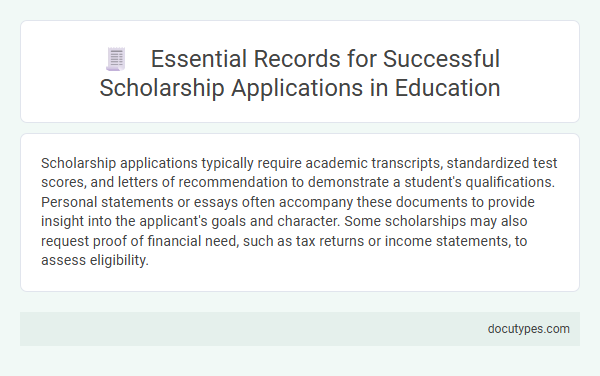Scholarship applications typically require academic transcripts, standardized test scores, and letters of recommendation to demonstrate a student's qualifications. Personal statements or essays often accompany these documents to provide insight into the applicant's goals and character. Some scholarships may also request proof of financial need, such as tax returns or income statements, to assess eligibility.
Understanding Scholarship Application Requirements
Scholarship applications require specific records to verify your eligibility and achievements. Understanding these requirements helps streamline the application process and increases the chances of approval.
Typically, scholarship applications request academic transcripts, letters of recommendation, and proof of extracurricular involvement. Financial documents may be necessary to demonstrate need-based eligibility. You should carefully review the application guidelines to ensure all required records are accurate and submitted on time.
Academic Transcripts: The Foundation of Your Application
Academic transcripts serve as the foundation of scholarship applications by providing a detailed record of a student's academic performance. These documents showcase grades, courses completed, and overall academic achievements, allowing scholarship committees to assess eligibility and merit. Ensuring transcripts are official and up-to-date strengthens the credibility of the application and increases the chances of securing financial aid.
Letters of Recommendation: Who and How to Ask
Letters of recommendation play a crucial role in scholarship applications by providing personalized insights into the applicant's abilities and character. Selecting the right recommenders and approaching them correctly can significantly enhance the quality of these letters.
- Choose reputable sources - Teachers, mentors, or supervisors familiar with your academic performance and personal qualities are ideal recommenders.
- Request early and politely - Ask for letters well in advance with a courteous explanation of the scholarship and its requirements.
- Provide necessary information - Supply recommenders with your resume, achievements, and details about the scholarship to help them craft a strong letter.
Effective letters of recommendation strengthen your scholarship application by highlighting your qualifications through credible and well-informed references.
Personal Statement and Motivation Letter Guidelines
Scholarship applications often require a personal statement and a motivation letter to evaluate an applicant's qualifications and enthusiasm. These documents should clearly articulate the candidate's goals, experiences, and reasons for pursuing the scholarship opportunity.
- Personal Statement - A concise narrative highlighting academic achievements and relevant experiences.
- Motivation Letter - An explanation of the applicant's passion and dedication towards their chosen field of study.
- Guidelines - Both documents should be well-structured, authentic, and tailored to the specific scholarship criteria.
Proof of Enrollment or Acceptance at Educational Institutions
Proof of enrollment or acceptance at an educational institution is a critical document required for scholarship applications. This document verifies that the applicant is officially registered or has been admitted to a recognized school, college, or university.
Common forms of proof include enrollment certificates, acceptance letters, or official admission notices issued by the institution. These records confirm the applicant's eligibility and help scholarship committees assess qualification accurately.
Standardized Test Scores: SAT, ACT, GRE, and Others
Standardized test scores are often a critical component of scholarship applications, showcasing an applicant's academic abilities and readiness for higher education. Commonly required tests include the SAT, ACT, and GRE, depending on the scholarship's focus and education level.
Applicants must submit official score reports directly from testing organizations to ensure authenticity. Some scholarships also accept scores from other standardized exams like the TOEFL or IELTS for international students.
Financial Documentation for Needs-Based Scholarships
What financial documents are required for needs-based scholarship applications?
Needs-based scholarships typically require proof of income such as tax returns, pay stubs, or bank statements. Applicants may also need to submit a financial aid form or a statement detailing their family's financial situation.
Certificates of Extracurricular Involvement or Leadership
| Record Type | Description | Importance for Scholarship | Examples |
|---|---|---|---|
| Certificates of Extracurricular Involvement | Documents that verify participation in clubs, sports, arts, or community service activities beyond academic requirements. | Provide evidence of well-roundedness, commitment, and time management skills, enhancing scholarship competitiveness. | Participation certificates from sports teams, club membership cards, volunteer service awards. |
| Leadership Certificates | Official recognition of leadership roles held in student organizations, clubs, or community groups. | Demonstrate leadership abilities, responsibility, and initiative, key qualities sought by scholarship committees. | Positions such as Student Council President, Club Leader, Team Captain badges, or leadership training completion certificates. |
Award and Achievement Documentation
Scholarship applications often require detailed award and achievement documentation to verify your accomplishments. Official certificates, transcripts, and letters of recognition serve as primary evidence of your academic or extracurricular success. Providing these records accurately strengthens your application and showcases your qualifications effectively.
Which Records Are Required for Scholarship Applications? Infographic

